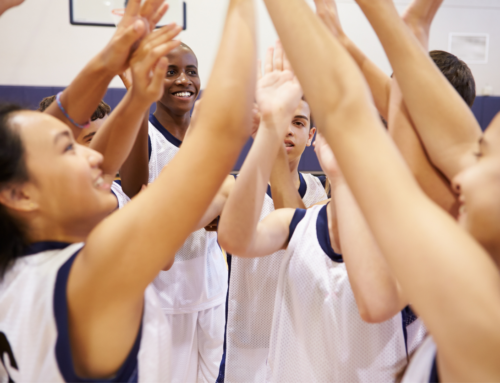The jump in competition from high school sports to college sports can be stunning.
To get recruited to play in college, you typically have to be one of the best high school athletes in your area. In college, you’re going to a level where everyone was one of the best in their area. Since upperclassmen have also had access to elite facilities, training, nutrition, and coaching since the day they stepped foot on campus, the gap between them and freshmen is often momentous. Unless you’re in that 1% who can come into college and compete at a high level right away, the transition is going to come with some adversity.
How you respond to that adversity will have a major impact on your career as a college athlete. With that in mind, here are five keys for successfully transitioning into the high-stress, hard-working life of an NCAA student-athlete.
1. What You Did Before Doesn’t Matter
One thing many college freshmen fail to understand is that they’re essentially starting from square one when they arrive on campus. It does not matter that you were all-state. It does not matter if you set a bunch of records. It doesn’t matter how many stars you earned from a recruiting service.
The only thing that matters is proving yourself at the NCAA level. There will be seniors on your team who want no part of being replaced by a freshman.
The best way to make this transition is just to let go of what was and focus on what can be. If every sentence that comes out of your mouth starts with “when I was in high school…,” you’re living in the past. If you’re living in the past, you can’t live today to the fullest. The sooner you can adopt the mentality of a walk-on, the better off you’ll be.
Not only will such a mentality make you a better athlete, but it will go a long way toward gaining the respect of your coaches and teammates.
2. Your Social Life Comes a Distant Third
It’s a story we’ve heard far too often.
An athlete goes to college, discovers freedom, alcohol, drugs, and the nightlife. A year later, they’ve lost their scholarship and are scrambling to transfer. Having fun and meeting new people is an essential part of the college experience, but you can easily take it too far.
You need to remember the morals and values that got you to college in the first place. Even if you don’t think drinking alcohol is a moral issue, there’s zero doubt that it decreases your athletic performance. It dehydrates you and makes you sleep poorly. The Stanford sleep studies directly examined how sleep and sleep quality affected college athletes, and the results were crystal clear. Insufficient sleep means you’ll play worse. Plenty of sleep means you’ll play better. It’s not complicated.
The freedom of college often leads many athletes to spend long nights out and about when they could be sleeping and getting ready for their next training session. It sounds boring, but I will say this, the sacrifice is always worth it. I remember having a night in college when I chose to stay in and felt like a loser. When I made the Olympic team in my junior year, I no longer felt those feelings.
3. Learn to Communicate With Your Coaches
When you are living on your own, you quickly realize how many problems you had in life that your parents just dealt with for you. Now, all of those tasks are in your own hands.
Perhaps your parents used to talk to the coaches for you. But this is a big-time now, and it’s up to you to communicate. You need to talk to your coaches and make sure you are on the same page with them. If you have a problem or are not getting the playing time you expected, Coach is not going to talk with your mommy about it until it gets resolved. You need to step up and start having a lot more tough conversations, and you’ll be better off for it.
Not only will you better understand your place on the team and what your coaches expect of you, but you’ll become a better communicator outside of sports and in whatever careers you take on after college. That’s a great skill to have. If you aren’t able to communicate with your coaches effectively, your time as a college athlete is going to be a whole lot tougher.
4. Focus on Injury Prevention
Few enter their career as an NCAA athlete thinking about injury prevention. You are focused on training hard. Everything you do will be more intense at the college level, and since you are trying to prove yourself, you will have very few easy reps.
This can start a vicious cycle, as your body will be more physically worn down, and your increased fatigue can make you care even less about injury prevention and recovery than you did beforehand.
But handling your recovery and injury prevention like a pro is one of the true secrets to success at the college level. To have a shot at becoming a standout athlete, you need to be healthy. And not just healthy, but optimal.
Making injury prevention a priority means doing many or all of the following:
- You will take your rest days seriously (not spend them partying.)
- You will sleep as much as possible (not stay up all night playing video games.)
- Eating healthy in the dining halls on a consistent basis
- When something starts hurting you, you will get on top of it right away.
- You will foam roll, take ice baths and stretch on a regular basis.
- You will take 100% ownership for your success and utilize all the amazing resources at your disposal.
5. Remember Why You Started Your Sport
The more money gets involved in the sport, the more the fun can be sucked out of it. Unfortunately, money is a major factor in college athletics. For the coaches to keep their jobs and continue feeding their families, they need you to perform at a high level. If you are not doing that, you become an obstacle for the team’s success. If they think you’re holding back the team and someone else could do your job better, they have no problem cutting your scholarship and giving someone else a shot. That is the ugly truth of the NCAA.
When times get tough, you’ve got to remember what made you fall in love with your sport in the first place. It will almost always go back to fun. No one starts playing sports because of money. You play because you enjoy working at it and achieving success in it. Remember some of the best times you have ever had in your sport, and hold onto that as you are going through some of the harder times.
No matter what school you compete at and what sport you play, your college career will have some ups and downs. Some of them you won’t have any control over. But every single day, you have the power to control:
- Your thoughts
- Attitude
- Effort
- Choices
There is no way to control what other people do. By focusing on these tips, you will be able to transition into your new role as an NCAA athlete more smoothly than many of your peers. Becoming a college athlete can be one of the hardest changes you make in life because you get so many new things thrown at you at once. If you go to a school that is far from home, then that difficulty can compound. But many before you have done it successfully, and there is no reason you can’t, too.
Original article posted on stack.com





